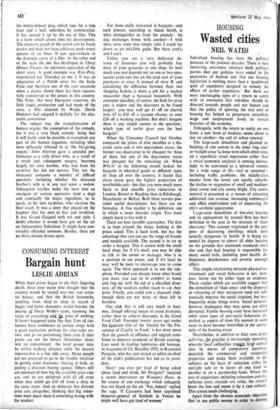Bargain hunt
CONSUMING INTEREST LESLIE ADRIAN
When fixed prices began to die their. lingering death, there were many who thought that the country would be turned into one vast orien- tal bazaar, and that the British housewife, scuttling from shop to shop in search of bigger and better discounts, would become the
inverse of Oscar Wilde's cynic, knowing the value of everything and the price of nothing.
It hasn't happened quite like that. Lots of Ctls-
tomers have confidence in certain shops with
a good reputation, perhaps for after-sales ser- vice, and go on patronising them even if their prices are not the lowest. Sometimes shops win on convenience: the local grocer may be within walking distance while the nearest supermarket is a bus ride away. Many people are not prepared to go to the trouble involved in getting some discounts—buying in bulk, or joining a discount buying agency. Others still are unaware of how big the available price clits are, and so are delighted with £5 off even when they could get £10 off from a shop in the same street. And an obdurate few distrust price cuts altogether, thinking that big reduc- tions must mean there is something wrong with the oroduct. For those really interested in bargains—and such interest, according to Adam Smith, is
what distinguishes us from the animals: 'no dog exchanges bones with another'—I wish there were some nice simple rules I could lay down as an infallible guide. But there aren't, and I can't.
Unless you are a very dedicated de- votee of discounts you will probably buy Most of your-groceries at one shop.. So bow much you save depends not on one or two spec- tacular price cuts but on the total cost of your purchases at store A instead of store B, and calculating the difference between these two shopping baskets is more a job for a market researcher than a harassed housewife. With consumer durables, of course, the field for price cuts is widest and the discounts- to be found largest: you may well get £1 off an electric iron, £5 to £10 off a vacuum cleaner, or over £20 off a washing machine. But don't imagine there is any simple answer to the question: which type of outlet gives you the best bargain?
When the Consumer Council last October compared the prices of nine durables at a dis- count store and at two department stores, the former was discovered to be cheapest for three of them, but one of the department stores was cheapest for the remaining six. When Which? in the following month looked for bargains in electrical goods at different types of shop all over the country, it found that chain stores gave the highest proportion of worthwhile cuts—but that you were much more likely to find sizeable price reductions in London, Bristol or Reading than in Edinburgh, Manchester or Belfast. Both these surveys pro- vided useful descriptions; but there are no formulae. A free market is by definition one in which a sweet disorder reigns. You must simply learn to live with it.
There are four possible approaches. The first is to hunt around the shops, looking at the prices asked. This is hard work, but has the advantage that you can see the range of brands and models available. The second is to try to strike a bargain. This is easiest with the small local shop; for if it's small, you may be able to talk to the owner or manager, who is in a position to cut prices, and if it's local he may well be keen to encourage you to come again. The third approach is to use the tele- phone. Provided you already know what brand you want, you can sit in comfort at home and ring up, with the aid of a classified direc- tory, all the stockists within reach to ask their price. Finally, you could join a discount club; though there are not many of these left in business.
One club that is still very much in busi- ness, though offering means to avoid dyspepsia rather than to achieve discounts, is the Good Food Club. Founded twenty years ago under to facetious title of the 'Society for the Pre- vention of -Cruelty to_Food,' it has done more than the growth of affluence and tolgistn.c9m- bined to improve standards of British catering. Last week its leading luminaries did homage, in magnums of Ch. Batailley 1955, to Raymond Postgate, who has just retired as editor-in-chief of the club's publications but not as its presi- dent.
'Don't you ever get tired of being asked. about food and drink, Mr Postgate?' inquired a recent interviewer on Woman's Hour, in the course of one exchange which unhappily was not heard on the air. 'Yes, indeed,' replied the sage, 'if Casanova had been appointed inspector-general of brothels in Venice he might well have got tired of women.'






































 Previous page
Previous page